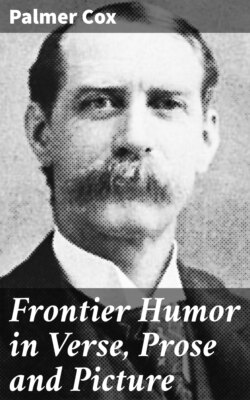Читать книгу Frontier Humor in Verse, Prose and Picture - Палмер Кокс - Страница 15
На сайте Литреса книга снята с продажи.
ST. PATRICK’S DAY.
ОглавлениеTable of Contents
Erin go bragh! St. Patrick’s day is upon us, and the city seems wrapped in a “mantle of green,” so numerous are the Irish flags flying in the breeze.
From hovel roof, and church of size
Alike, the harp and sun-burst flies!
The ear of morn is stunned with the bray of at least a dozen blatant bands, as they discourse Old Erin’s soul-stirring airs. It is an easy matter for a person to imagine himself sitting by some sheeling door in “County Kerry” instead of this great American city by the sea. The Ancient Order of Hibernians and the Fenians are out in full force, with clean-boiled shirts and soap-washed faces. Marshals charge around upon their caparisoned steeds like real heroes, and sitting gracefully as a sack of potatoes upon the back of a spavined mule trotting over a corduroy road. Evidently some of them have never before bent over anything that came nigher to an equine than a saw-horse. It is plain
Those who always rode, now ride the more,
And those now ride who never rode before.
Well, they love the country that gave them birth, and that is a virtue that is certainly commendable,—a natural excellence often wanting in other nationalities. Besides, celebrating the old gentleman’s birthday makes business lively with the stable men and the shoemakers, and that of itself is a good reason why the demonstration should be encouraged. It is hardly probable that any of the great powers will be materially weakened by these loyal manifestations.
Here is a sketch of a spirited member of the “Ancient Order of Hibernians,” as he appeared passing my window in the morning, full of life and loyalty, tripping the asphaltum pavement lightly as though traversing the springy surface of his native bogs. And following is another sketch of the same individual in the evening, when full of oaths and whiskey, lying in the gutter with all that ease and abandon which characterizes the Celtic race, wherever dispersed, in every land and in every age.
IN THE MORNING.
The different races of men have their different weaknesses. It may seem an extravagant statement, but I venture to say if there had been no rice plant in the world, the Chinese would not have cared to live. I will even go further and say perhaps there would have been no Mongolian race. And now the thought occurs to me, this deficiency in the human family would not have been such a terrible thing after all. True, we should have been obliged to get along with catnip tea instead of Souchong, which would have been pretty heavy on old women. We also would have been obliged to worry through without old Confucius, which might have made some confusion in metaphysics or political morality. But as the latter could hardly be worse than it is at present with all his teachings, we possibly might have managed to exist very well without the moon-eyed philosopher.
IN THE EVENING.
The Teuton dotes on his well-seasoned bologna. The grizzly Emperor William I, standing upon an eminence near Rezonville, overlooking the battle-field, with a spy-glass in one hand and a large bologna sausage in the other, furnished indeed a striking sketch for the special artist of the occasion. The humor of the situation came in when the Emperor, forgetting himself in the excitement of the moment, raised the sausage to his eye instead of the spy-glass, and because he failed to see the squadron of Uhlans—that a moment before were charging upon a battery—concluded they were blown to smithereens, and losing his usual equanimity, commenced to swear fearfully, and order up another division to take their place. There was a broad and sarcastic humor couched in the remark of the officer at his side, who observed the mistake, and ventured the suggestion, “If your Majesty will take another bite from the sausage, perhaps you will be able to see through it.”
And then, there is the jovial, careless, free-hearted, yet quarrelsome Irishman, who thinks a new Jerusalem without a little whiskey still in one corner of it,—“over beyant the throne, and forninst the back dure,” for instance—would be just no Paradise at all. I believe there is not a race of men on the face of the earth—from Behring Straits to Terra del Fuego, round and about, over and under, or down either quarter—that can extract the same genuine soul-satisfying bliss from a flattened nose or swelled lip, that a real, irrepressible, County Kerry Irishman can. Let him have that, and a good stiff horn of whiskey to keep the blood running freely, and my advice to you is, keep upon the other side of the street, if you intend to sit for your picture that afternoon, or visit your sweetheart that evening, or expect to take up the collection during divine worship the next Sunday. At such a time he is no respecter of persons, this set-up Irishman.
You may be the Rector of the finest cathedral in the place, the mayor of the city, the judge of the supreme court, or even the governor of the state, and should your hat chance to blow off and roll in front of him,—though it should cost him a fall upon the pavement,—that man will kick it. I tell you he will kick it, and soundly too. He will make no mincing about it, but go for it, as he would for his neighbor’s pig, should he find it in his garden of cabbages. At such he is full of words also, and can bestow upon the stone that trips him up the same flow of abuse that he can shower upon the man who assists him to his feet.
